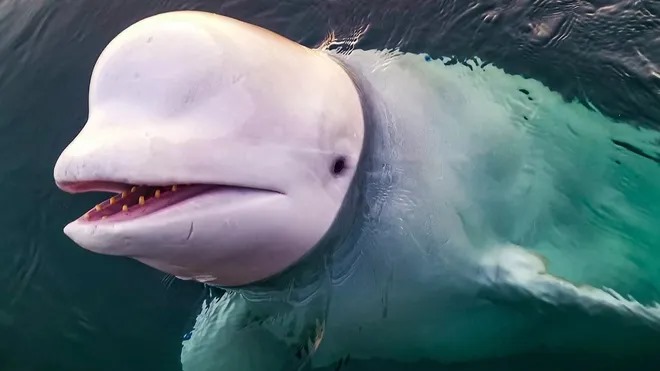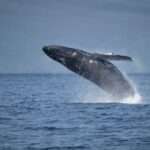
The “Russian Spy” beluga whale that has been found dead in Norway believed to have been shot (USA Today)
by Mick the Ram
A popular beluga whale which was believed to have been trained for spying missions by the Russians, has been found dead in the harbour of Stavanger, a city in south-western Norway.
It had gained notoriety after it first appeared off the coast of the Norwegian region of Finnmark back in 2019.
The creature was initially discovered wearing an unusual man-made harness and mount, which sparked the spy theories given the history that Russia’s military has in attempting to weaponize sea mammals.
The whale was given the name Hvaldimir by the locals and became something of a celebrity throughout Norway, with it appearing regularly up and down the coast.
Animal rights groups reported that the beluga had multiple bullet wounds when alerted to the lifeless body in the bay last weekend.
Police urged to open criminal investigation
Animal rights groups: NOAH and One Whale, have filed complaints and requested the Norwegian police open a “criminal investigation” given the strong “suspicion of criminal activity” that exists.
An autopsy has been carried out on the 14 foot, 2,700 pound beluga and its report is expected before the end of the month.
Heartbreak for organisations
Nevertheless, the head of One Whale, Regina Crosby Haug, did confirm the presence of “multiple bullet wounds around his body.” In a statement issued by the organisation they said they were “heartbroken” and “angry”.
They explained how they had been fighting hard for a long time to help the whale out of danger and said they had reached a point where he was finally “close to having a better life.”
Beacon of hope
Marine Mind, a Norwegian non-profit organisation, which had been tracking Hvaldimir’s movements for years, remarked that he was not just a beluga whale: “he was a beacon of hope, a symbol of connection and a reminder of the deep bond between humans and the natural world.”
Marine biologist Sebastian Strand, struggled to find the appropriate words, but highlighted that his death had “profoundly impacted thousands of people lives.”
Still very young
He was thought to be around 15 years old, so given that beluga whales can live to anywhere between 40 and 60 years, he still had decades left in him.
The nickname of Hvaldimir was a play on the word “hval” which is Norwegian for whale, and the first name of the Russian president, given the apparent ties to the country where it is thought he may have escaped an enclosure after a period of training.
Happy to play
It was 26 April 2019 when he first came to officials attention, just north of Hammerfest, near to the village of Tufjord, around 300km (190 miles) from the Russian maritime border.
The tight-fitting camera harness he had around him had on it a label marked “Equipment St Petersburg” and he was rubbing against boats in apparent attempts to free himself.
Norwegian marine biologists removed it from its plastic clasps, but the whale continued to return to the boats for several days, asking for food and playing “fetch”.
Tameness proof of previous human interaction
It was evident from the start that he was very tame, even allowing his blowhole to be periodically scratched by hand.
The natural conclusion was that he had been part of some sort of research military programme before crossing into Norwegian waters.
No Russian acceptance
Over the years, Hvaldimir’s movements around densely populated areas had raised concerns about the risk of injury from boats and fishing gear, but the fisheries directorate acknowledged his popularity, saying: “no matter what now, a beloved friend of many is gone.”
Moscow has never issued any official reaction to the speculation coming out of Norway that Hvaldimir could be a “Russian spy.”






0 Comments